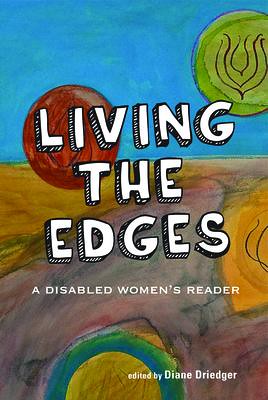 Here’s a book for your list, if you’re celebrating a gifty holiday soon – or just splurge on it for yourself!
Here’s a book for your list, if you’re celebrating a gifty holiday soon – or just splurge on it for yourself!
Living the Edges: A Disabled Women’s Reader, edited by Diane Driedger, was launched last week in Canada, and it should contain plenty of interest for readers of FWD/Forward.
The McNally Robinson book-launch blurb is as follows:
Diane Driedger has written extensively about the issues of women and people with disabilities over the past 30 years. Diane is an educator, administrator, activist, and researcher in the area of disabled women’s issues in Canada and internationally. She is also a visual artist and poet, and holds a Ph.D. in Education. She lives in Winnipeg.
This collection brings together the diverse voices of women with various disabilities, both physical and mental. The women speak frankly about the societal barriers they encounter in their everyday lives due to social attitudes and physical and systemic inaccessibility. They bring to light the discrimination they experience through sexism, because they are women, and through ableism, because they have disabilities. For them, the personal is definitely political.
While society traditionally views having a disability as “weakness” and that women are the “weaker” sex, this collection points to the strength, persistence, and resilience of disabled women living the edges.
A partial contents list, from Disability Research Forum reveals a whole lot of must-read articles:
“Feminism, Disability and Transcendence of the Body” by Susan Wendell
“Living on the Edges” by Charlotte Caron and Gail Christy
“Mirror Woman: Cracked Up Crazy Bitch Conja Identity” by Marie Annharte Baker;
“Margins Are Not For Cowards” by Cheryl Gibson;
“Triple Jeopardy: Native Women with Disabilities” by Doreen Demas
“Coming Out of Two Closets” by Jane Field;
“Performing My Leaky Body” by Julie Devaney
“To Be Or Not to Be? Whose Question Is It, Anyway? Two Women With Disabilities Discuss the Right To Assisted Suicide” by Tanis Doe and Barbara Ladouceu
“Living Poorly: Disabled Women on Income Support” by Sally Kimpson
“‘Have You Experienced Violence or Abuse?’: Talking With Girls and Young Women with Disabilities” by Michelle Owen
“The Geography of Oppression” by Joy Asham
There was an audio interview with Diane Driedger at CBC’s Weekend Morning Show last Sunday, in which Diane speaks of the book and of her experiences with invisible disabilities and workplace accommodations.
My transcript of the Weekend Morning Show interview, titled “Double Jeopardy”, is below the cut. All errors in transcription are mine.
Continue reading New book: Living the Edges: A Disabled Women’s Reader